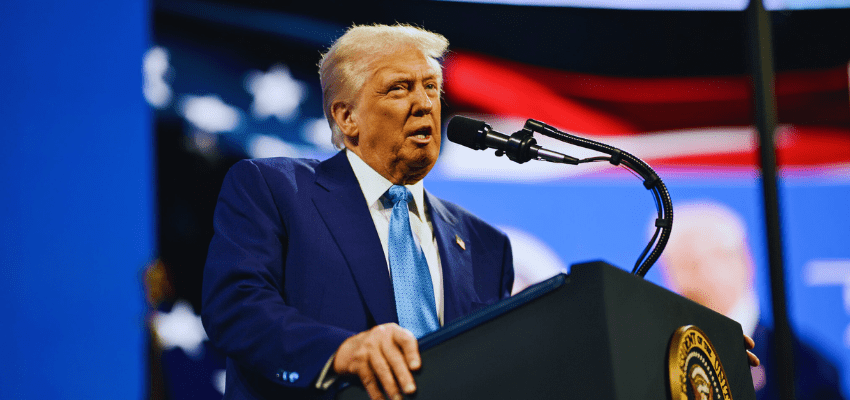This article originally appeared in The Hub.
By Brian Lee Crowley, March 31, 2025
When we are under the impulse of strong emotion, the French advise us to turn our tongue seven times in our mouth before speaking. This sage advice to give reason a moment to catch up to and overmaster our anger is particularly apt in thinking about how to respond to Donald Trump’s tariffs, which we’re set to learn more about this week.
Our first and perfectly understandable impulse is to try and hurt Trump back. Not only is our ability to do so limited, however, calm reflection suggests a far better goal for Canada. That goal comes in two parts: limit the damage in the short run and increase the pressure on Trump to see the virtue of free trade with Canada in the longer term. Both are eminently feasible if we keep our heads.
To give into the impulse of anger is to make the mistake of thinking that we cannot make the situation worse and can even improve it by responding in kind. As Doug Ford discovered when he tried unilaterally to raise electricity prices for Americans, only to backtrack a day later, Trump is ready to respond immediately to Canada upping the stakes. Moreover, his power to hurt us is far greater than our power to hurt him.
There are reasons for this. History has made us both the beneficiaries of a commonality of language, legal systems, and outlook that we share with very few other countries. Geography has made us neighbours, and economists are clear that perhaps four-fifths of trade relationships are down to geography and the other fifth to trade arrangements, such as free trade agreements.
We famously have free trade agreements with Israel, much of the Indo-Pacific (CPTPP), and the European Union (CETA), but none of those agreements has made anything but a marginal dent in our trade relationship with the U.S. History, geography, and economics have joined us inextricably at the ankle, the knee, the hip and the shoulder with the U.S. That is not going to change.
We are one of the most trade-dependent countries in the world. We export roughly one-half of everything the private sector produces, and something on the order of three-quarters of that goes to the U.S. Nor do we generally send to the U.S. entirely Canadian-made finished products that might, just might, be diverted to customers elsewhere in the world. Something like two-thirds of our exports to the U.S. are intra-firm trade, meaning they are exchanges between parts of continental firms, and are inextricably bound up in continental supply chains. For Canada, there is no alternative to deep dependence on the U.S.
America, by contrast, needs us far less than we need them. Only a quarter of their economy derives from international trade as a whole and Canada represents a modest fraction of that. Yes, we can impose trade barriers that hurt specific people Trump cares about, as when Jack Daniels had to lay off workers in response to provincial liquor boards shutting off access to Canadian customers. But because of our greater vulnerability to American trade action and Trump’s willingness to respond aggressively to actions we might take, retaliation might feel good but ultimately hurts us more than it hurts him.
Does this mean we should do nothing? Of course not. But the most important thing for us to do is to remember that Trump’s tariffs are their own punishment.
No matter who signs the cheque to pay the tariff, the fact is that the cost is ultimately passed on to the consumer. And the consumers of the products Trump is taxing are Americans.
Because aluminum production is energy-intensive and Quebec electricity is cheap, Canada has a comparative advantage in aluminum production. This is not a nefarious plot to do down America, but a simple fact of economic life that has given Americans cheap access to aluminum by buying from Canada. Trump cannot wave a magic tariff wand and make that advantage disappear. America has little production capacity, and it would take years and billions in investment to create it.
In the meantime, since America cannot replace Canadian aluminum with American aluminum, American consumers will simply have to pay more for the aluminum they will still have to buy from Canada. And if American capacity is eventually created, it too will be more expensive than the Canadian-produced product. Either way, Americans will have to pay more than they used to.
Multiply this across the many industries into which Canadian products are deeply interwoven. Take autos, for example. Where Canadian producers have a competitive advantage, they supply parts and assembly, which, again, would take years to create in the U.S. In the short to medium term, auto manufacturers will simply have to continue to rely on the Canadian suppliers within their supply chain and pass the resulting tariff onto consumers.
My colleague Philip Cross, former chief economist at Statistics Canada, estimates that Trump’s tariff actions could raise the price of autos to U.S. consumers by as much as $12,000 USD. Tariffs on Canadian oil will similarly raise the cost of gasoline to U.S. drivers. That is why Trump’s tariffs are their own punishment.
The beauty of letting Trump stew in his own juices and not responding in kind is that we deprive him of the opportunity to blame U.S. inflation on Canadian retaliatory action. He then has to explain to his voters why he has made the cost of living skyrocket.
Not only will the “Blame Canada” tactic not be available to him, but Canada will appear to be the soul of discretion and self-control.
So time is on our side if we keep our powder dry and let Americans savour the bitter fruit of a tariff war brought to them by their own president.
Instead of giving in to our anger and consternation and envenoming relations further, we should use our time more wisely. In particular, we should be preparing for the inevitable moment when the president needs to return to the bargaining table. We must be ready with a set of proposals for Canadian actions on issues that Trump cares about. This is not about capitulation to Trump’s imperious posturing. Instead, it is offering him a face-saving retreat from tariff self-harm. We know he wants Canadian action on defence spending, Arctic security, border management, immigration, national security, organized crime, drug trafficking, relations with China, and a host of other areas where change is actually in Canada’s interest too. In exchange for a return to trade sanity, we can offer the president what he needs: a package he can sell as a “yuge win” for America.
The fact that it would also be a splendid victory for Canada we could perhaps, in our self-effacing Canadian way, savour quietly while Trump does his victory dance. It is a small price to pay.






